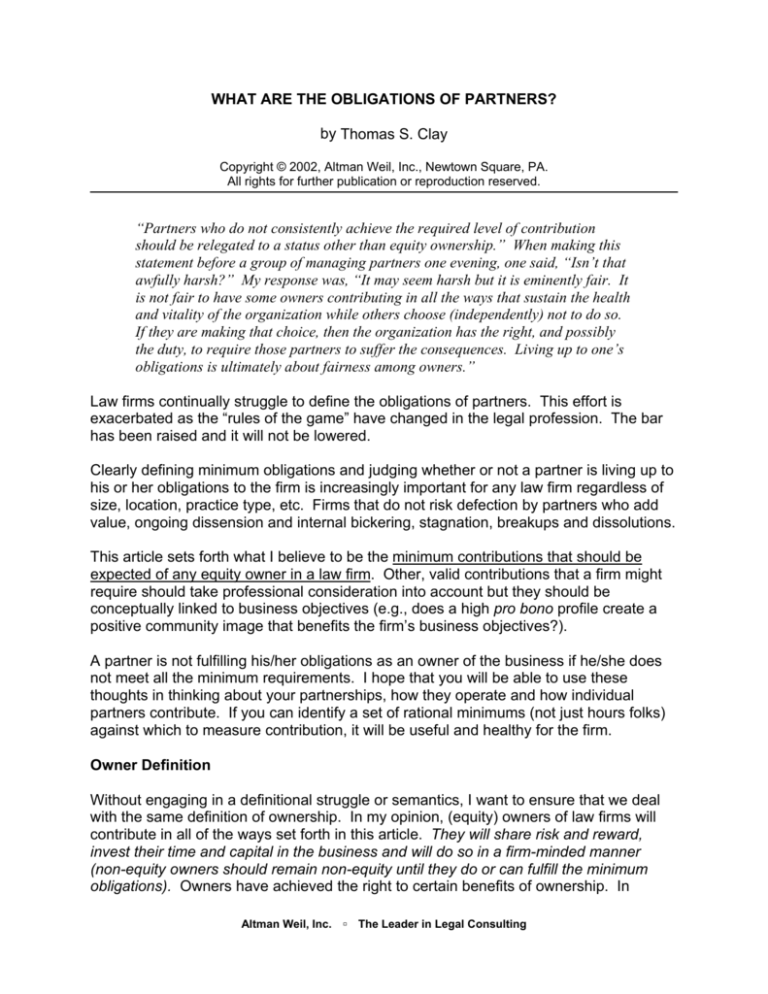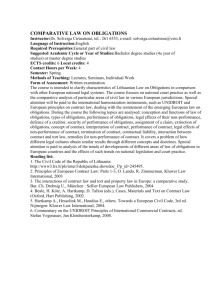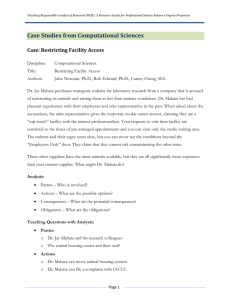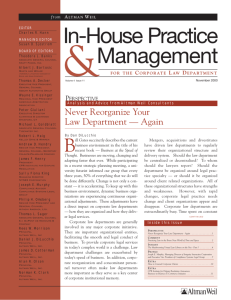what are the obligations of partners
advertisement

WHAT ARE THE OBLIGATIONS OF PARTNERS? by Thomas S. Clay Copyright © 2002, Altman Weil, Inc., Newtown Square, PA. All rights for further publication or reproduction reserved. “Partners who do not consistently achieve the required level of contribution should be relegated to a status other than equity ownership.” When making this statement before a group of managing partners one evening, one said, “Isn’t that awfully harsh?” My response was, “It may seem harsh but it is eminently fair. It is not fair to have some owners contributing in all the ways that sustain the health and vitality of the organization while others choose (independently) not to do so. If they are making that choice, then the organization has the right, and possibly the duty, to require those partners to suffer the consequences. Living up to one’s obligations is ultimately about fairness among owners.” Law firms continually struggle to define the obligations of partners. This effort is exacerbated as the “rules of the game” have changed in the legal profession. The bar has been raised and it will not be lowered. Clearly defining minimum obligations and judging whether or not a partner is living up to his or her obligations to the firm is increasingly important for any law firm regardless of size, location, practice type, etc. Firms that do not risk defection by partners who add value, ongoing dissension and internal bickering, stagnation, breakups and dissolutions. This article sets forth what I believe to be the minimum contributions that should be expected of any equity owner in a law firm. Other, valid contributions that a firm might require should take professional consideration into account but they should be conceptually linked to business objectives (e.g., does a high pro bono profile create a positive community image that benefits the firm’s business objectives?). A partner is not fulfilling his/her obligations as an owner of the business if he/she does not meet all the minimum requirements. I hope that you will be able to use these thoughts in thinking about your partnerships, how they operate and how individual partners contribute. If you can identify a set of rational minimums (not just hours folks) against which to measure contribution, it will be useful and healthy for the firm. Owner Definition Without engaging in a definitional struggle or semantics, I want to ensure that we deal with the same definition of ownership. In my opinion, (equity) owners of law firms will contribute in all of the ways set forth in this article. They will share risk and reward, invest their time and capital in the business and will do so in a firm-minded manner (non-equity owners should remain non-equity until they do or can fulfill the minimum obligations). Owners have achieved the right to certain benefits of ownership. In Altman Weil, Inc. ▫ The Leader in Legal Consulting What Are the Obligations of Partners? Page 2 of 7 addition, they have agreed to undertake obligations greater than those of non-owners. Too many partners seem to believe that their obligations and contributions can decrease once they have achieved the mantle of ownership. That is a problem with which firms will struggle for a while to come. Adding Value Adding value has become a platitude strewn about by nearly everyone. But, adding value is precisely what we need from partners. They must do something that enhances the value of the firm other than doing legal work. Consider the litigation partner who typically works 2,300 billable hours a year, bills that commensurate amount and has exceptionally high working attorney fee receipts. This partner, however, does nothing else. His contributions are valuable, this year, but the firm is no better off the next year or the following year. What investment or legacy has this partner left that improves the firm’s fortunes or competitiveness? None, really, although he is a useful economic producer. Or, how about the 53-year-old partner who has steadily seen his work decline until he bills 1,100 hours per year and does nothing else on behalf of the firm. He says, “I am ready to do anything that is available in terms of legal work,” however, he does very little to either go get work from clients or others in the firm. In addition, he is a negative influence around the firm, constantly harping about the fact that the firm is no longer collegial and is losing its soul. Neither of these individuals is acting like an owner. Although they may have current value, they clearly are not adding value to the firm. The Fallacy of the Finder Minder Binder Grinder Concept In the past, it has been said that firms have finders—those who find the work; minders— those who mind the work; binders—those who manage the work and clients; and grinders—those who simply turn out legal work. It has been thought that partners could select (typically independently) from these functions in the firm and fulfill the obligations of the partner. Firms no longer have that luxury. As with any highly competitive and entrepreneurial situation, the owners of the organization need to do it all. That is not to say that the “mix” of contributions would be the same for all partners. Not all partners would find work in the same manner nor would they all produce legal work at the same level. The point is, however, that we need the efforts of all partners in all areas if they are to be treated like equity owners. Firms would do well to forget the finder, minder, binder, grinder theory if it means selecting one or two ways of contributing. Owners have to perform all the functions. Altman Weil, Inc. ▫ The Leader in Legal Consulting What Are the Obligations of Partners? Page 3 of 7 The Contribution The bar has been raised. It is no one’s fault; it is also not going to be lowered. It means that partners in law firms have to act like true owners in a business where they are concerned with production, sales, asset management and profitability. What then do you need from every one of your owners? 1. Client Determined Service Quality The Obligation Every partner is obligated to provide “client determined” quality services. This means that clients, prospective clients and internal clients (other partners) must receive the level of attention, treatment, timely service, etc., that “they” expect from every partner. Rationale Professional competency is the “price of admission” to the mature legal market. Client defined quality will increasingly become the competitive differentiator. Lawyers can no longer be comfortable in delivering the service quality they choose. Clients and perspective clients have too many options and are increasingly demanding. Partners also must serve other partners and their clients in an acceptable manner. Law firm mission statements and similar documentation are crowded with platitudes regarding “highest quality legal services.” Unfortunately, firms often ignore assessing service quality because the partner produces a high volume of fee receipts. If there is any single criterion on which a partner cannot fall down, it is this one. 2. Practice Development The Obligation To energetically participate in practice development efforts for one’s self and for or with others. Rationale There are things that any lawyer can do to help develop the firm’s practice. Not everyone should aspire to becoming a traditional rainmaker, for that is irrational. However, there must be ongoing efforts in practice development by all owners in order to increase or maintain business. Strategies such as writing to demonstrate competency, speaking and effective networking, cross-selling and similar activities are still effective means of practice development. Altman Weil, Inc. ▫ The Leader in Legal Consulting What Are the Obligations of Partners? Page 4 of 7 3. Management Contribution The Obligation Every partner has an obligation to participate in (some portion of) management to ensure the effective, efficient running of the professional and business sides of the practice. Rationale Law firms increasingly have management needs that did not exist ten years ago. Some of these needs are ongoing, such as those of a practice leader, others are ad hoc, such as someone assigned to evaluate the firm’s insurance plan. When (if?) law firms accept non-lawyer, professional managers to run their organizations, without intolerable interference, then lawyers can avoid many management duties. However, until that time, owners will have to provide the bulk of management expertise and effort. Otherwise, the firm will suffer competitively. 4. Skill and Knowledge Transfer The Obligation Every partner should, through formal and informal means (mentoring, CLE, briefing/debriefing, training programs, etc.), participate in the development of younger attorneys into effective practitioners. Rationale The transfer of knowledge and know-how regarding technical and practical law practice is poorly attended to in many American law firms. This increasingly frustrates younger lawyers, results in lawyers who do not gain skill as rapidly as they should and, therefore, are not as valuable (economically) in the marketplace. A trend among (some) corporate counsel is to not allow law firms to use young associates, because those associates are not perceived to add value. The faster the skills of new lawyers can be built, the quicker the market will recognize the associates’ value. 5. Firm Mindedness The Obligation An owner must act in a collaborative, team-oriented manner, complying with firm policies, systems and procedures, treating all lawyers and staff with respect and putting the firm first—NO JERKS TOLERATED. Altman Weil, Inc. ▫ The Leader in Legal Consulting What Are the Obligations of Partners? Page 5 of 7 Rationale Law firms simply do not have the time to deal with aberrant behavior, even on behalf of economically productive lawyers. In addition, tolerating such behavior sends the wrong message to other attorneys. Many is the managing partner who has told me that they agonized for years over what to do with “Bill,” who was a productive, economic contributor but a total non-team player. When Bill either left or was asked to leave, there was almost immediate total agreement in the partnership that “we should have done it years ago.” Effective organizations do not tolerate destructive behavior. 6. Personal Economic Contribution The Obligation Each owner should seek to produce working attorney fee receipts, on a yearly basis, in an amount that would cover his or her compensation plus allocated overhead. Rationale At a time when leverage in law firms is increasingly difficult to achieve, when there is immense pressure on hours, rates and realization, it is necessary for all lawyers to be economically viable (from a productive perspective). The objective is for each owner to meet the economic threshold and participate in the profits available from other sources in the firm, i.e., associates. As a practical matter, not every owner will be a break-even “by the numbers.” That is okay if the attorney is deemed (by the firm) to add value in other ways. These “other ways” can be and should be quantified in terms of their contribution to the firm. However, absent clearly adding value in other ways, an owner must be economically viable “by the numbers.” Summary Evaluating a partner and determining what his or her contributions should be is not an easy task. It is also a task that must occur and must increasingly be rational and candid. Following this article is a form that might assist you in evaluating partners. At least it might serve to generate discussion among partners regarding what the obligations are, what you will commit to and how you will judge one another. I asked the Managing Partner of a firm that had implemented the program I have suggested herein “how it went this year during compensation time.” He said, “The decisions weren’t any easier, but we were dealing with a clear set of criteria and our judgments were rational.” That is all you can ask for. Altman Weil, Inc. ▫ The Leader in Legal Consulting Page 6 of 7 What Are the Obligations of Partners? EVALUATING A PARTNER’S CONTRIBUTIONS Answer the following questions with respect to each partner. Use the following scale to rank each partner in the areas listed in the table below: 1 = Unacceptable contribution 2 = Substandard contribution 3 = Meets standard expectations 4 = Exceeds standard expectations 5 = Superior contribution AREA RATING Client Service Quality Does this partner consistently provide the requisite quality client service? Practice Development Does this partner engage in practice development efforts for himself and others? Management Does this partner participate in management as needed? Skill and Knowledge Transfer Firm Mindedness Does this partner do his/her duty regarding mentoring, training, etc.? Does this partner consistently act in a firm-minded manner? Economic Contribution Working Attorney Fee Receipts: $______________ Less Allocated Overhead: $______________ Less Attorney Compensation: $______________ = Contribution/(Shortfall): $______________ Altman Weil, Inc. ▫ The Leader in Legal Consulting Page 7 of 7 What Are the Obligations of Partners? Is this partner fulfilling his/her obligations as a partner? Yes __ No __ Comments: Does he/she make the partnership more valuable? Yes __ No __ Comments: Altman Weil, Inc. ▫ The Leader in Legal Consulting








